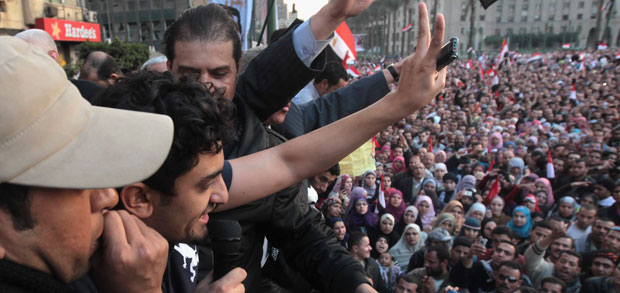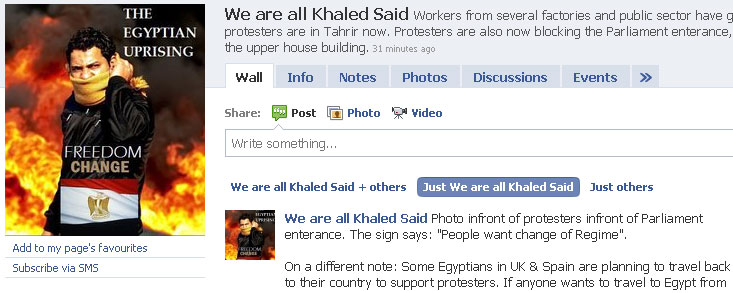Egypt: behind the online ‘hero’ who galvanised the protests
As Egyptians are moved by a tearful testimony of a Google executive arrested by state police, his online colleague tells Channel 4 News how the internet campaign began and why he fears for his safety.

“None of us know each other, or any details about each other – not even first names. We both call each other Khaled.
“I remember I was talking to him on Google chat and we were watching Tunisia’s revolution together and he said, we have to do something similar. He then posted online.”
“Khaled Said” speaks to Channel 4 News from an anonymous username via a secure web connection which hides his identity. Khaled is not his real name, nor is another pseudonym of choice “Al Shaheeed”, which translates as “The Martyr”.
Coined in tribute of a young activist beaten to death by police outside his home in June last year, Khaled Said is an online cause celebre which, with Facebook as a platform, has helped mobilise tens of thousands of Egyptians to speak out against the ruling regime and demand change.
Until last weekend Khaled had no idea his fellow online activist, who runs the Arabic version of the site “We Are All Khaled Said“, was Google marketing executive Wael Ghonim (pictured above), who revealed his identity after being arrested in Cairo and detained by police for over a week.
Inspiration and action
Ghonim started his online human rights campaign over seven months ago. Aware of the potential of gaining a global audience online, Khaled offered his services to Ghonim and began an English-language version of the site, which now has tens of thousands of users.
I can’t go public now. I have to stay like that for my security. I would be kidnapped for if I disclose my identity. ‘Khaled’
After watching the ousting of President Ben Ali in Tunisia, Ghonim called for Egyptians to take action against their own regime on 25 January. Just days after the widespread unrest began, Ghonim disappeared.
He was held by police for 12 days before being released on Monday amid a search campaign headed by his employer Google.
His emotional appearance on Egyptian independent television moved thousands of people to join the protests for the first time on Tuesday.
When Ghonim himself appeared in Tahrir Square, he was cheered by the crowd and hailed as the reluctant hero whose television appearance undercut the state propaganda of the last two weeks.
For Khaled, his newly exposed online friend has given new momentum to the anti-government protests and inspired thousands more to take to the streets.
He told Channel 4 News: “Wael’s appearance live on local Egyptian private TV channel Dream has made a lot of people change their mind after Mubarak’s government spread lies on National TV saying he was an Israeli and Iranian agent.
“So when people saw him, they knew this is a person who really loves Egypt.”
Media battle
“We are all Khaled Said” is just one online group among many, but its influence on tech-savvy young Egyptians – and the global social media network – is undeniable.
The Arabic version of the site is already viewed by over 600,000 people, and it’s growing all this time with users from across the globe offering their support.

The messages of defiance which sprawl the wall of the website, and its English-language counterpart, are unprecedented and while tens of thousands of Egyptians enjoy a rare moment of freedom on the streets of Cairo, activists are still being hunted down and detained for inciting revolt.
Realising the importance of the media war protesters have fought back, broadcasting information on the internet 24 hours a day.
Groups of demonstrators have been pictured setting up communal ‘online hubs’ near Tahrir Square, the focus for protests in the capital, where information is filmed on the streets and then uploaded online.
‘I can’t go public’
Footage has circulated of Egyptians crowding around power points where a mass of mobile phones – the weapon of choice – are recharged.
Despite the high profile events of the past few days Khaled told Channel 4 News while he continues to raise awareness of the campaign on an international scale, he still doesn’t feel safe enough to reveal his identity – even to his online friend and close colleague Wael Ghonim.
“No, I can’t go public now. I have to stay like that for my security,” he said.
“Wael was kidnapped by state security police and blindfolded for 12 days. I don’t know how many days I would be kidnapped for if I disclose my identity.
“I will not have Google asking about me so I could [be detained] much longer.”
Khaled told Channel 4 News that the movement started as a human rights campaign against alleged torture and humiliation of Egyptians by state police. But following the continued uprising across Egypt it was now about long term change.
“We won’t accept compromise,” Khaled told Channel 4 News.
“We are changing a 30 year dictatorship so we know things will take time, but we will win at the end – as long as we keep our protests peaceful.”